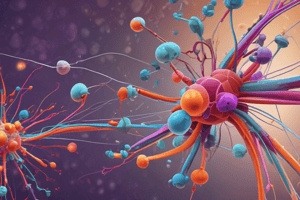Podcast
Questions and Answers
What is the primary function of an enzyme?
What is the primary function of an enzyme?
- To consume reactants
- To decrease reaction rates
- To increase reaction rates (correct)
- To catalyze chemical reactions in both forward and reverse directions
What is the region on the enzyme surface where substrate binding occurs?
What is the region on the enzyme surface where substrate binding occurs?
- Catalytic site
- Active site (correct)
- Coeffector site
- Binding site
What type of enzyme catalyzes the formation of new covalent bonds?
What type of enzyme catalyzes the formation of new covalent bonds?
- Hydrolases
- Ligases (correct)
- Transferases
- Oxidoreductases
What is the term for the binding of molecules to an enzyme that affects its activity?
What is the term for the binding of molecules to an enzyme that affects its activity?
What is the term for genetic disorders resulting from enzyme deficiencies?
What is the term for genetic disorders resulting from enzyme deficiencies?
Flashcards are hidden until you start studying
Study Notes
Enzymes Biochemistry
Definition and Function
- Biological molecules that catalyze chemical reactions
- Increase reaction rates without being consumed by the reaction
- Highly specific to substrate molecules
Characteristics
- Protein structure: Most enzymes are proteins, composed of amino acids
- Active site: Region on the enzyme surface where substrate binding occurs
- Optimal pH and temperature: Enzymes have specific pH and temperature ranges for optimal activity
- Cofactors and coenzymes: Some enzymes require additional molecules to function
Mechanisms of Action
- Lock and key model: Enzyme active site complements substrate shape
- Induced fit model: Enzyme active site changes shape to fit substrate
- Acid-base catalysis: Enzyme uses acidic or basic residues to facilitate reaction
- Covalent catalysis: Enzyme forms a temporary covalent bond with substrate
Types of Enzymes
- Oxidoreductases: Catalyze oxidation and reduction reactions
- Transferases: Catalyze transfer of functional groups
- Hydrolases: Catalyze hydrolysis reactions
- Ligases: Catalyze formation of new covalent bonds
- Isomerases: Catalyze isomerization reactions
- Lyases: Catalyze cleavage of various chemical bonds
Enzyme Regulation
- Allosteric regulation: Binding of molecules to enzyme affects activity
- Feedback inhibition: Product of a reaction inhibits an earlier step in the pathway
- Substrate inhibition: High substrate concentrations inhibit enzyme activity
- Cooperative binding: Binding of multiple substrate molecules affects enzyme activity
Clinical Significance
- Enzyme deficiencies: Genetic disorders resulting from enzyme deficiencies
- Enzyme inhibitors: Medications that inhibit specific enzymes
- Enzyme assays: Laboratory tests to measure enzyme activity
Studying That Suits You
Use AI to generate personalized quizzes and flashcards to suit your learning preferences.




